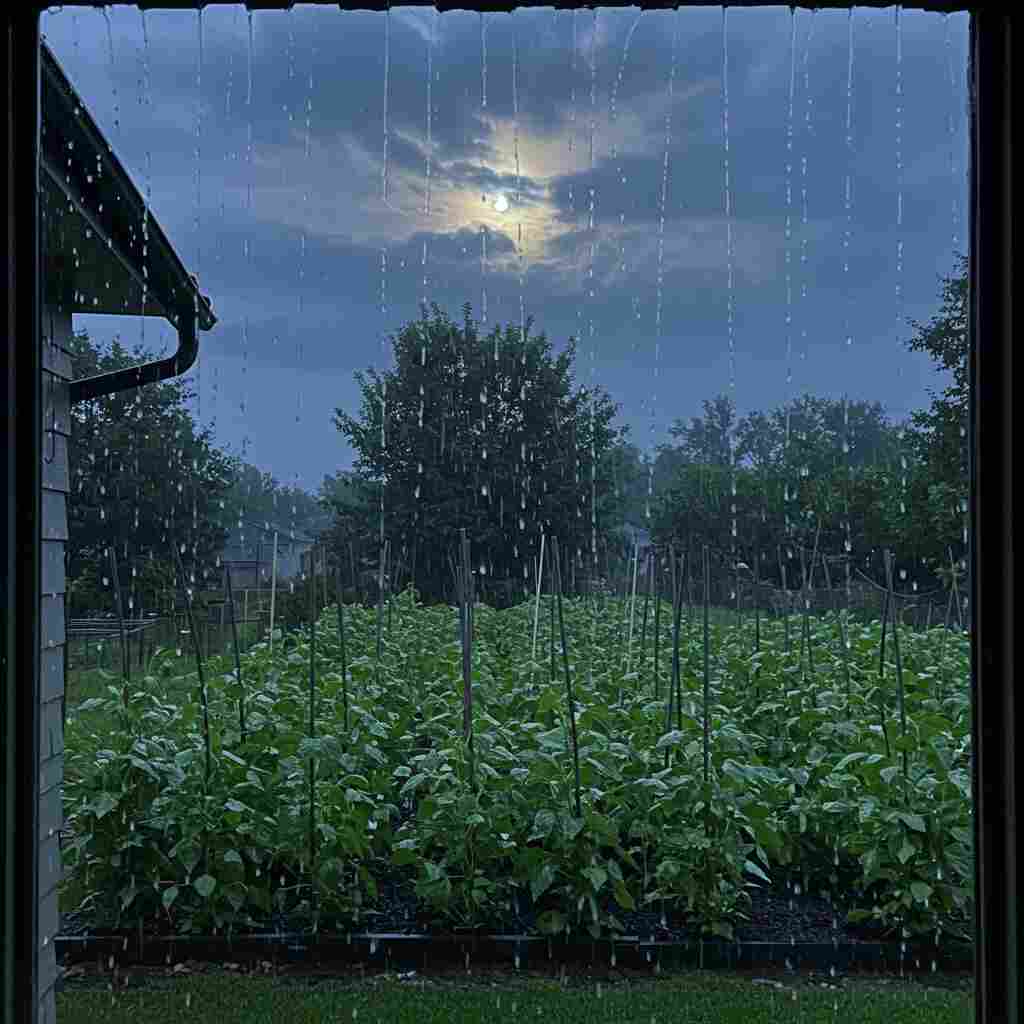If it should rain
Edna St. Vincent Millay
1892 to 1950

If it should rain—(the sneezy moon
Said: Rain)—then I shall hear it soon
From shingles into gutters fall . . .
And know of what concerns me, all:
The garden will be wet till noon—
I may not walk—my temper leans
To myths and legends—through the beans
Till they are dried—lest I should spread
Diseases they have never had.
I hear the rain: it comes down straight.
Now I can sleep, I need not wait
To close the windows anywhere.
Tomorrow, it may be, I might
Do things to set the whole world right.
There’s nothing I can do tonight.
Edna St. Vincent Millay's If it should rain
Edna St. Vincent Millay, one of the most celebrated poets of the early 20th century, is renowned for her lyrical precision, emotional intensity, and keen sensitivity to both personal and universal human experiences. Her poem “If it should rain” is a deceptively simple meditation on resignation, control, and the quiet surrender to forces beyond human influence. Through its delicate interplay of domestic imagery and existential musings, the poem captures a moment of introspection that resonates with both immediacy and timelessness.
This analysis will explore the poem’s thematic concerns, its use of literary devices, and its place within Millay’s broader oeuvre, while also considering its historical and philosophical underpinnings. By examining the interplay between the external world (the rain, the garden) and the speaker’s internal reflections, we can uncover the poem’s deeper implications about human agency, the passage of time, and the solace found in small, ordinary moments.
Themes of Resignation and Agency
At its core, “If it should rain” is a poem about acceptance—about recognizing the limits of one’s control and finding peace in that recognition. The speaker begins by anticipating rain, not with distress but with a quiet acknowledgment: “If it should rain—(the sneezy moon / Said: Rain)—then I shall hear it soon.” The parenthetical aside, attributing the prediction of rain to the “sneezy moon,” introduces a whimsical, almost childlike personification, suggesting that nature itself is an active participant in the unfolding events. This anthropomorphism softens the inevitability of the rain, framing it not as an impersonal force but as something almost communicative, as if the moon has whispered its intentions.
The rain’s arrival brings with it a series of consequences: the garden will be wet, the speaker cannot walk among the beans, and there is a faint, almost superstitious fear of spreading “diseases they have never had.” These concerns are minor, almost domestic in their specificity, yet they carry a symbolic weight. The garden, a traditional symbol of cultivation and human effort, is rendered temporarily inaccessible, a reminder that nature operates on its own schedule, indifferent to human plans. The speaker’s reluctance to walk among the beans—lest she disturb them—suggests a delicate balance between human intervention and natural order.
Yet, rather than lamenting this loss of agency, the speaker finds a peculiar comfort in it: “Now I can sleep, I need not wait / To close the windows anywhere.” The rain absolves her of responsibility; there is nothing left to do but rest. This moment of surrender is both practical and philosophical—an acknowledgment that some things are beyond control, and that there is relief in letting go.
The Tension Between Action and Inaction
The poem’s closing lines introduce a subtle but profound shift in tone:
“Tomorrow, it may be, I might
Do things to set the whole world right.
There’s nothing I can do tonight.”
Here, the speaker contrasts the grand, almost hyperbolic ambition of setting “the whole world right” with the quiet passivity of the present moment. The conditional phrasing (“it may be, I might”) suggests both hope and hesitation—a recognition that such grand actions are possible in theory, but perhaps not in practice. The final line, “There’s nothing I can do tonight,” is both a resignation and a reprieve. It acknowledges the limitations of the present while leaving open the possibility of future action.
This tension between ambition and inertia is a recurring theme in Millay’s work. As a poet who came of age during the Progressive Era and lived through the upheavals of two World Wars, Millay was deeply attuned to the interplay between individual agency and larger societal forces. In “If it should rain,” the domestic sphere becomes a microcosm for these broader concerns. The speaker’s small, confined world—the garden, the rain, the closed windows—mirrors the human condition itself: we are often at the mercy of forces beyond our control, and our grandest aspirations must sometimes yield to the immediacy of the moment.
Literary Devices and Tone
Millay’s use of language in this poem is characteristically precise, blending conversational ease with poetic richness. The opening lines establish a tone of quiet intimacy, as if the speaker is confiding in the reader. The enjambment and rhythmic flow mimic the natural cadence of thought, reinforcing the poem’s meditative quality.
The imagery is tactile and sensory—the sound of rain on shingles, the dampness of the garden, the act of closing windows—all of which ground the poem in a tangible reality. Yet these concrete details also serve a symbolic function. The rain, often a symbol of renewal or melancholy, here becomes a neutral force, neither benevolent nor malevolent, simply inevitable.
The poem’s brevity and apparent simplicity belie its depth. There is no grand rhetoric, no sweeping emotional declarations—only a series of quiet observations that accumulate into something quietly profound. This restraint is one of Millay’s greatest strengths as a poet; she conveys complex emotional states with economy and precision.
Historical and Biographical Context
Millay wrote during a period of immense social and cultural change. The early 20th century saw the rise of modernism, the women’s suffrage movement, and the aftermath of World War I—all of which influenced her work. While “If it should rain” is not overtly political, its themes of resignation and the limits of control may reflect the broader disillusionment of the post-war era.
Biographically, Millay was known for her fierce independence and bohemian lifestyle, yet her poetry often reveals a more vulnerable, introspective side. The speaker’s quiet acceptance in this poem may echo Millay’s own moments of weariness—her recognition that even the most determined individuals must sometimes yield to circumstance.
Conclusion: The Quiet Wisdom of Surrender
“If it should rain” is a poem that finds profundity in the ordinary. It does not seek to resolve grand existential questions but instead offers a fleeting, deeply human moment of pause. In its gentle acceptance of limitation, it suggests that there is wisdom—even peace—in recognizing when to act and when to rest.
Millay’s genius lies in her ability to transform the mundane into the meaningful. A rainy night, a damp garden, an unclosed window—these small details become vessels for larger truths about human existence. The poem reminds us that sometimes, the most radical act is not striving to “set the whole world right,” but simply allowing oneself to be still, to listen to the rain, and to wait for tomorrow.
In an age of relentless productivity and perpetual motion, Millay’s poem is a quiet but necessary counterpoint—a reminder that there is grace in surrender, and that even in stillness, there is depth.
This text was generated by AI and is for reference only. Learn more
Want to join the discussion? Reopen or create a unique username to comment. No personal details required!



Comments
No comments yet. Be the first to comment!